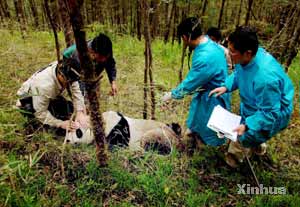| Tools: Save | Print | E-mail | Most Read |
| One Small Step for Mankind -- One Giant Step for Pandas? |
| Adjust font size: |
Xiang Xiang, a four-year-old giant panda born in captivity, took a historic step forward when he walked off into the wild in Wolong, a traditional habitat for the endangered species, in southwest China's Sichuan Province.
He became the first-ever, hand reared, giant panda to be released into the wild and has undergone three years of survival training to ensure he was ready for the experience. Xiang Xiang will be monitored through a global positioning device attached to a collar. Facing his new world and despite his training, the panda hesitated for a second on Friday before wandering off into bamboo groves. Xiang Xiang, which means "auspicious," weighs 83 kilograms and is 1.1 meters tall. Watching him leave, Liu Bin, who helped look after him during his three years in captivity turned away shedding tears. . "Xiang Xiang is like my child who has grown up and left the family to live independently," said Liu. "I hate to part with Xiang Xiang and I hope he can survive on his own without forgetting me!" The panda eats 8 kilograms of bamboo shoots a day as well as such as corn buns explained Liu. Born at the China Giant Panda Protection and Research Center in Wolong in 2001 Xiang Xiang was selected from more than 100 giant pandas bred in captivity for natural habitat training because he was strong and healthy, said experts. He learned how to build a den, forage for food, mark his territory and developed his own defensive skills of howling and biting, explained Zhang Hemin, head of the panda research centre. Zhang said they chose to release Xiang Xiang at this time because in late April his favorite bamboo shoots are sprouting. Xiang Xiang faces many new challenges, one of which is a parasitic infection, said Zhou Xiaoping, deputy chief engineer at the centre. "Parasites can be fatal for a giant panda," Zhou said. "The bamboo shoots they eat in captivity are disinfected and scientists regularly check for parasites." There are more than 180 giant pandas in captivity and 1,590 in the wild mostly in Sichuan. Xiang Xiang's liberation marks a significant change in saving the endangered species with moves to train them to return to the wild, said Zhao Xuemin, deputy head of the State Forestry Administration. Chinese scientists had previously given priority to artificial-breeding and protection, Zhao said. Plans are afoot to release other endangered species into the wild such as Chinese alligators, wild horses and the bird "red ibis". (China Daily April 29, 2006)
|
| Tools: Save | Print | E-mail | Most Read |
 |
| Related Stories |
|
| Product Directory China Search |
Country Search Hot Buys |
